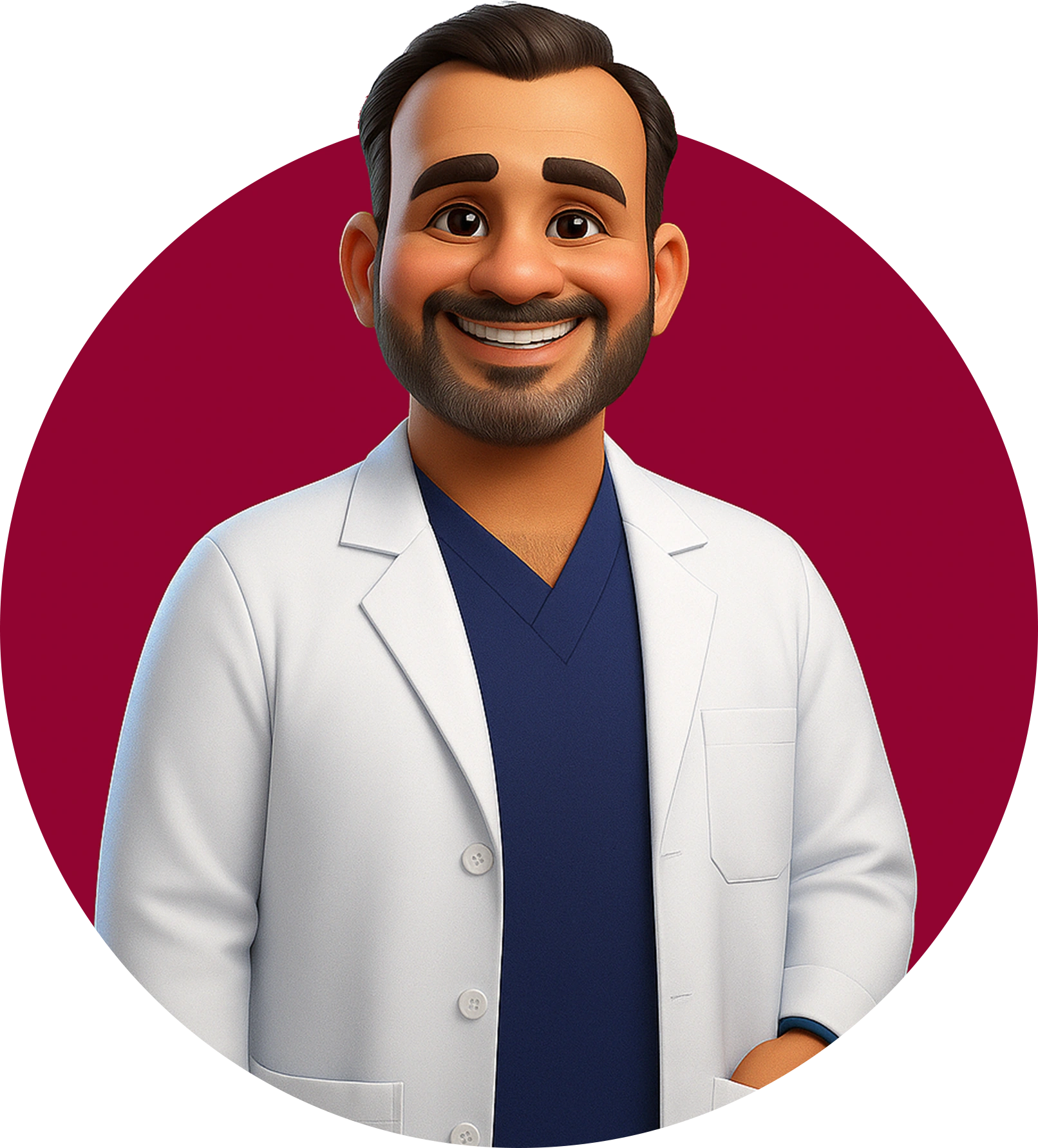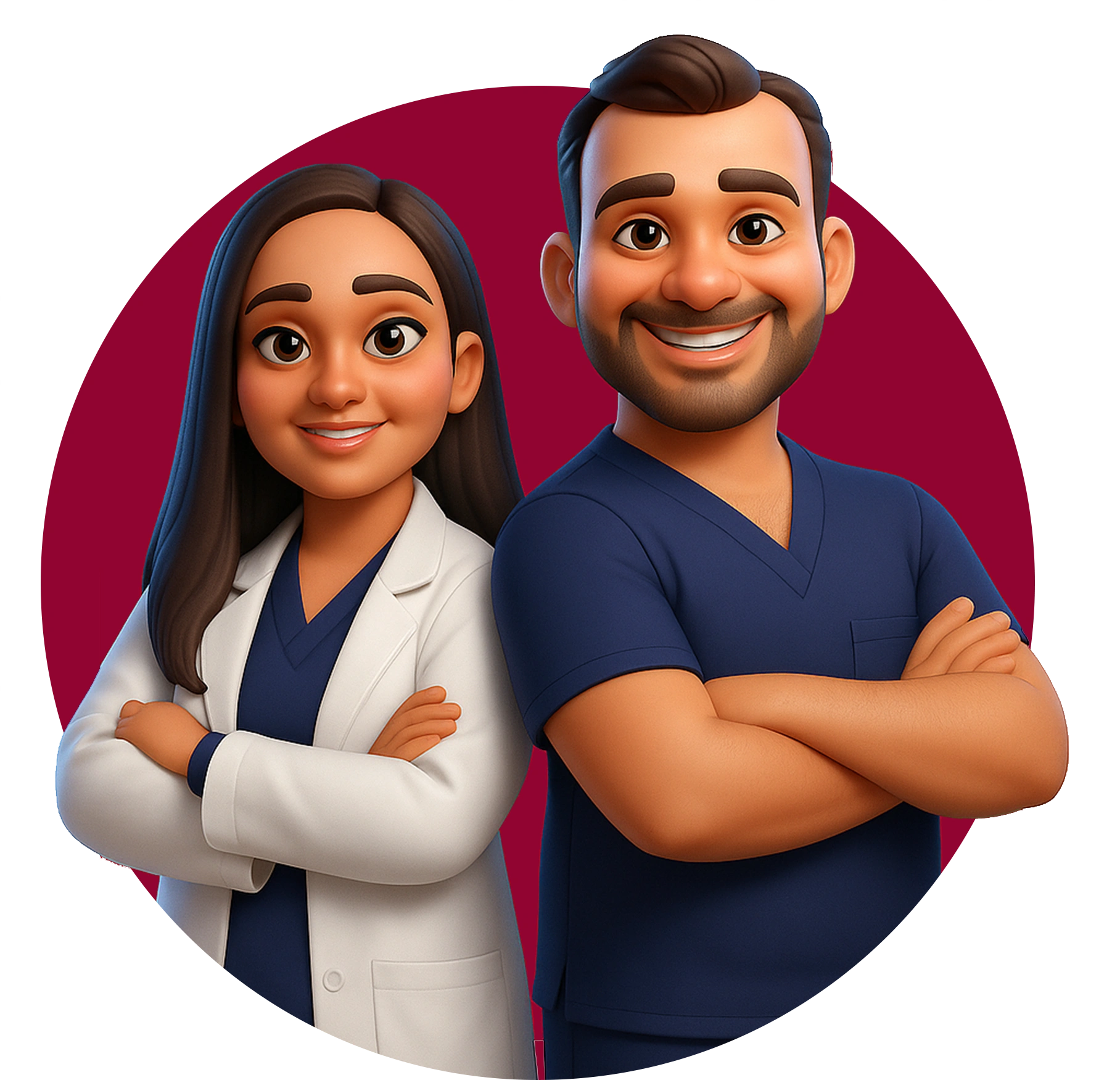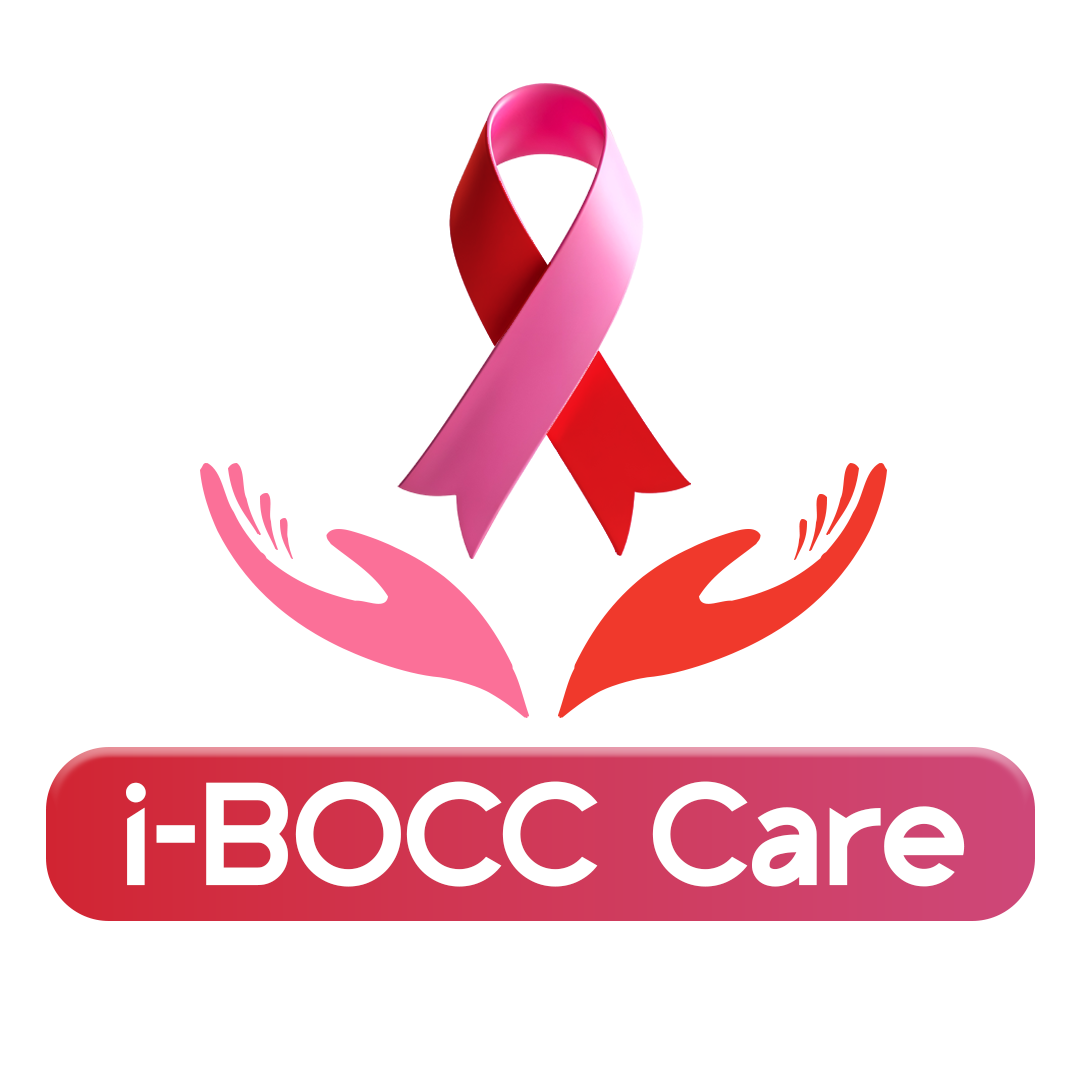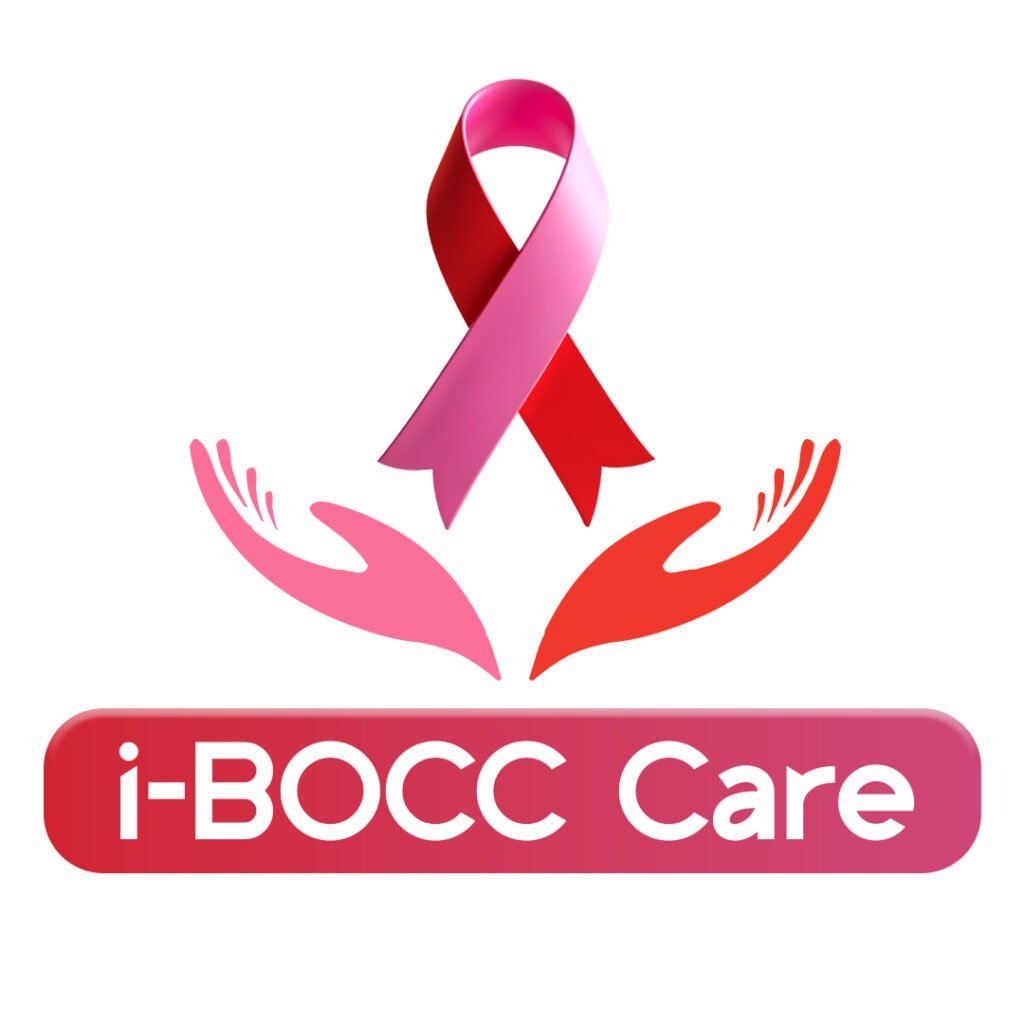FREQUENTLY ASKED QUESTIONS
Breast Cancer

Early signs of breast cancer can vary, but common symptoms include:
- Breast lumps or thickening in the breast tissue that is new or different.
- Changes in breast size, shape, or appearance.
- Nipple discharge (other than breast milk), which may be bloody or clear.
- Skin changes such as redness, dimpling, or puckering on the breast.
- Pain in the breast or underarm area, even without a noticeable lump.
It is crucial to pay attention to any changes in your breast tissue and consult with an oncologist for early detection and breast cancer screening. Early intervention is key to successful treatment.
Breast cancer is diagnosed through a combination of physical examination, imaging tests, and biopsy. Key diagnostic steps include:
- Mammogram: The primary screening tool for early breast cancer detection, especially in women above 40.
- Ultrasound: Often used to examine suspicious areas identified in a mammogram.
- MRI (Magnetic Resonance Imaging): Used for detailed imaging in certain cases.
- Biopsy: The definitive test where a sample of tissue is taken from the suspicious area for microscopic examination.
Biopsy results help confirm whether the lump is cancerous and guide the treatment plan.
Several factors can increase the risk of breast cancer, including:
- Age: Risk increases as you age, especially after 50.
- Family history: A close family member with breast cancer can increase your risk.
- Hormonal factors: Early menstruation, late menopause, and hormone replacement therapy (HRT) are linked to higher risk.
- Lifestyle factors: Excessive alcohol consumption, being overweight, and lack of physical activity can increase your risk.
- Genetic mutations: Inherited mutations like BRCA1 and BRCA2 significantly increase the risk.
Understanding these factors is important for identifying those at high risk and guiding early breast cancer screening.
Yes, breast cancer can be inherited through genetic mutations. The most well-known mutations are in the BRCA1 and BRCA2 genes. Individuals with these mutations have a significantly higher risk of developing breast and ovarian cancer.
If you have a family history of breast cancer or other cancers, it is important to discuss genetic counseling and testing with your oncologist. Early monitoring and screening for breast cancer may be advised for individuals at high genetic risk.
Breast cancer screening guidelines vary based on age, family history, and other risk factors. However, general recommendations are:
- Women aged 40-44 should consider starting annual mammograms.
- Women aged 45-54 should undergo annual mammograms.
- Women aged 55 and older can switch to biennial mammograms or continue annual screenings based on personal risk factors.
If you have high-risk factors such as a family history or genetic mutations, your doctor may recommend starting screenings earlier and/or additional tests like MRI.
A mammogram is an X-ray of the breast used for early breast cancer detection. It can detect lumps or changes in the breast tissue that may not be felt during a physical exam. Mammograms are essential for:
- Early detection of breast cancer, often before symptoms appear.
- Identifying non-cancerous conditions like cysts or fibrocystic changes.
- Preventing the spread of cancer by identifying it in its earliest stages, when treatment is most effective.
A lump is any abnormal growth or swelling, and it could be benign or malignant. Common causes of breast lumps include fibroadenomas and breast cancer.
A cyst, on the other hand, is a fluid-filled sac in the breast and is usually benign. Breast cysts are more common in women under 40 and are typically non-cancerous.
If you find a lump or cyst, it is essential to seek medical advice for proper diagnosis and breast cancer screening.
Breast cancer is staged from 0 to IV, depending on its size, whether it has spread to the lymph nodes, and if it has spread to other parts of the body:
- Stage 0: Non-invasive cancer (DCIS).
- Stage I: Small, localized tumors.
- Stage II: Larger tumors or some lymph node involvement.
- Stage III: Tumors spread to nearby lymph nodes or tissues.
- Stage IV: Metastatic cancer, where cancer has spread to other organs.
Early-stage cancers are typically treated successfully with surgery, radiation, and chemotherapy.
Yes, breast cancer in men is rare but possible. Male breast cancer accounts for about 1% of all breast cancer cases. Symptoms in men include:
- Lumps or swelling in the chest area.
- Pain or tenderness in the breast tissue.
- Nipple discharge or changes.
Although male breast cancer is less common, men with a family history of breast cancer or genetic mutations like BRCA1 or BRCA2 are at a higher risk.
The survival rate for breast cancer depends on factors like stage, age, and overall health. According to statistics:
- 5-year survival rate for localized breast cancer is about 99%.
- 5-year survival rate for regional spread is around 86%.
- 5-year survival rate for metastatic breast cancer is about 27%.
Early detection and effective treatment significantly improve survival rates, emphasizing the importance of regular breast cancer screenings.
Treatment for breast cancer is highly personalized and may include:
- Surgery: Lumpectomy or mastectomy.
- Chemotherapy: To shrink or eliminate tumors.
- Radiation therapy: To target remaining cancer cells post-surgery.
- Hormonal therapy: For hormone-sensitive cancers.
- Targeted therapy: Focuses on specific cancer cell features.
- Immunotherapy: Boosts the immune system to fight cancer.
A comprehensive treatment plan is developed based on the cancer’s stage and type.
Surgery is often required for breast cancer to remove tumors or affected tissue. Whether you need surgery depends on:
- The type and stage of cancer.
- Whether breast conservation surgery (lumpectomy) or a mastectomy is recommended.
- The involvement of lymph nodes and surrounding tissues.
Dr. Ashutosh Tondare will help determine the best surgical approach based on your diagnosis and overall health.
- Lumpectomy: Removal of the tumor and a small portion of healthy tissue, often preserving the breast.
- Mastectomy: Complete removal of the breast tissue, sometimes including nearby lymph nodes.
Lumpectomy is often chosen for early-stage cancers and when cosmetic appearance is a concern, whereas mastectomy is typically for more advanced cases.
Recovery times vary:
- Lumpectomy: Recovery typically takes 1-2 weeks.
- Mastectomy: Recovery may take 4-6 weeks, depending on the extent of the surgery.
Post-surgery, physical therapy and rehabilitation are essential for functional restoration and emotional recovery.
In many cases, breastfeeding after breast cancer treatment is possible, especially if the surgery involves only one breast. However, treatments like chemotherapy and radiation can affect milk production. It’s important to discuss your breastfeeding plans with your oncologist before treatment begins.
Chemotherapy can cause side effects, such as:
- Fatigue and nausea.
- Hair loss and skin changes.
- Weakened immune system.
- Loss of appetite and mood swings.
Most side effects subside after treatment, and supportive care is provided to manage them.
Not all patients need radiation therapy. It’s typically used for:
- Post-surgery treatment to eliminate any remaining cancer cells.
- Advanced breast cancers to shrink tumors before surgery.
- Certain breast cancer stages (e.g., Stage II or higher).
Your oncologist will decide based on cancer type and stage.
The risk of breast cancer recurrence depends on several factors:
- Cancer stage and type.
- Tumor size and whether lymph nodes are involved.
- Hormone receptor status and genetic factors.
Regular follow-up appointments and screenings help detect recurrence early.
Yes, certain lifestyle changes can lower the risk of breast cancer, including:
- Maintaining a healthy weight.
- Limiting alcohol consumption.
- Regular exercise.
- Balanced diet rich in fruits, vegetables, and whole grains.
These steps, alongside regular breast cancer screening, can significantly reduce your risk.
Hormonal therapy blocks hormones like estrogen or progesterone that fuel the growth of hormone receptor-positive breast cancer. It can:
- Reduce recurrence risk.
- Shrink tumors.
- Prevent cancer spread to other parts of the body.
This treatment is used after surgery or in metastatic breast cancer.
HER2-positive breast cancer occurs when the HER2 gene makes the cancer cells grow uncontrollably. HER2 is a protein that promotes cancer cell growth, and when overexpressed, it leads to a more aggressive form of cancer.
Treatment options for HER2-positive breast cancer include:
- Targeted therapy (e.g., Herceptin or Perjeta) to block HER2 and reduce cancer cell growth.
- Chemotherapy to shrink or kill cancer cells.
- Surgery (lumpectomy or mastectomy) to remove the tumor.
- Radiation therapy may also be recommended after surgery to eliminate any remaining cells.
Early detection and personalized treatment plans help improve outcomes for HER2-positive breast cancer patients.
A biopsy is a procedure where a small sample of tissue is removed from the suspicious area in the breast for examination under a microscope. A biopsy is required when:
- A lump or abnormality is found during a mammogram, ultrasound, or physical examination.
- To confirm whether the tissue is benign or malignant.
- To determine the type and stage of cancer for personalized treatment options.
Core needle biopsy and fine-needle aspiration are the most common techniques used for breast cancer diagnosis. This procedure is essential for accurate diagnosis and treatment planning.
A breast cancer diagnosis can be emotionally overwhelming. Managing the emotional impact is as important as physical recovery. Here are steps to help:
- Seek emotional support from loved ones, counselors, or support groups.
- Mindfulness and relaxation techniques like meditation and breathing exercises can reduce stress.
- Professional therapy (psychological counseling) helps in managing fear, anxiety, and depression.
- Engage with others who have faced breast cancer through support networks to share experiences and coping strategies.
- Be proactive in learning about your treatment options, as knowledge empowers you to take control of your journey.
Holistic care, including mental health support, is an integral part of breast cancer treatment to ensure overall well-being during and after treatment.
Genetics play a significant role in breast cancer risk, with BRCA1 and BRCA2 mutations being the most well-known hereditary factors. These mutations can significantly increase the likelihood of developing breast cancer and ovarian cancer.
Genetic counseling and testing can help assess the risk, especially for individuals with:
- A family history of breast or ovarian cancer.
- Multiple family members diagnosed with cancer at a young age.
- Personal history of hormone receptor-positive or triple-negative breast cancer.
If genetic mutations are present, preventive strategies such as early screening, preventive surgery, and hormonal therapy can significantly reduce the risk of breast cancer.
While breast cancer prevention is not guaranteed, several steps can reduce the risk:
- Regular screenings (mammograms, ultrasound, MRI) for early detection.
- Genetic testing for high-risk individuals with a family history or genetic mutations like BRCA.
- Healthy lifestyle choices: Maintain a healthy weight, limit alcohol intake, exercise regularly, and follow a balanced diet.
- Breastfeeding: Women who breastfeed have a lower risk of developing breast cancer later in life.
- Preventive medications: Drugs like Tamoxifen may be prescribed to high-risk women to reduce the chances of developing breast cancer.
While breast cancer cannot always be prevented, early detection and lifestyle modifications can reduce the risk and improve the chances of successful treatment.
Oral Cancer
Oral cancer symptoms can vary, but common signs include:
- Mouth sores or ulcers that do not heal.
- Lumps or thickening in the mouth, neck, or throat.
- Persistent pain or discomfort in the mouth, tongue, or throat.
- Difficulty swallowing, chewing, or moving the jaw.
- Unexplained bleeding or numbness in the mouth.
- Change in voice or hoarseness.
Early detection through regular oral cancer screenings is vital for better treatment outcomes.
Oral cancer is diagnosed using a combination of physical examination, imaging tests, and biopsy. The diagnostic process includes:
- Visual examination of the oral cavity for abnormalities.
- Biopsy: Removing a tissue sample to check for cancer cells.
- Imaging tests like CT scans, MRI, and X-rays to assess the spread and size of the tumor.
- PET scans can be used to detect cancer spread to other parts of the body.
A biopsy is essential for confirming oral cancer and determining the treatment plan.
Several factors can increase the risk of oral cancer, including:
- Tobacco use (smoking and chewing tobacco).
- Excessive alcohol consumption.
- Human papillomavirus (HPV), especially high-risk strains like HPV-16.
- Poor diet, lacking fruits and vegetables.
- Age: Risk increases after 40, especially for men.
- Family history of oral cancer or other cancers.
- Weakened immune system, such as those with HIV or undergoing immunosuppressive treatments.
Understanding these risk factors helps identify those at higher risk for oral cancer.
Yes, oral cancer can develop without noticeable symptoms, particularly in the early stages. Regular oral cancer screenings are essential, especially for individuals at higher risk, as early detection significantly improves treatment outcomes.
In some cases, oral cancer can be inherited, particularly if there is a family history of cancer. Genetic mutations, such as those in the p53 gene, may increase the risk of developing oral cancer. However, lifestyle factors like tobacco use and alcohol consumption are the main causes. Genetic counseling is recommended for families with a history of oral or other cancers.
Tobacco (smoking and chewing) and alcohol are major risk factors for oral cancer. They can cause:
- DNA damage in the cells of the mouth, leading to cancer.
- Synergistic effect: The combination of tobacco and alcohol significantly increases the risk.
- Delayed healing of oral tissues, making them more susceptible to cancerous changes.
Quitting tobacco and reducing alcohol intake can help lower the risk of oral cancer.

HPV, particularly HPV-16, is a significant risk factor for oral cancer, especially in non-smokers. It is believed that:
- HPV causes genetic changes in the oral mucosa, leading to the development of cancer.
- It is transmitted through oral sex and affects the throat and tonsils.
Vaccination against HPV can help reduce the risk of oral cancers associated with the virus.
While oral cancer cannot always be fully prevented, its risk can be reduced by:
- Avoiding tobacco and limiting alcohol consumption.
- HPV vaccination to reduce the risk of HPV-related cancers.
- Regular screenings for early detection.
- Eating a balanced diet, rich in fruits and vegetables.
- Practicing good oral hygiene.
Early lifestyle changes and screenings are the best prevention strategies.
The survival rate for oral cancer varies depending on the stage at diagnosis:
- Early-stage oral cancer (Stage I) has a 5-year survival rate of around 80-90%.
- Stage II or III oral cancer has a 5-year survival rate of 60-70%.
- Stage IV (metastatic cancer) has a significantly lower survival rate, around 30-40%.
Early detection through oral cancer screening plays a crucial role in improving survival rates.
Oral cancer is staged based on the tumor’s size, lymph node involvement, and whether it has spread to other parts of the body. The stages range from 0 to IV:
- Stage 0: Non-invasive, confined to the surface layer of cells (e.g., leukoplakia).
- Stage I: Small, localized tumor.
- Stage II: Tumor has grown but is still confined to the mouth.
- Stage III: Tumor has spread to nearby lymph nodes.
- Stage IV: Cancer has spread to other parts of the body.
Staging helps determine the treatment plan and prognosis.
Oral cancer treatments include:
- Surgery: Removal of the tumor or affected tissues (often with reconstructive surgery).
- Radiation therapy: To target and kill cancer cells post-surgery or for inoperable tumors.
- Chemotherapy: Used for advanced cancer or when cancer has spread.
- Targeted therapy: Drugs that target specific cancer cells without harming normal tissues.
- Immunotherapy: Boosting the immune system to fight cancer.
The treatment plan will depend on the stage and location of the cancer.
Surgery plays a key role in the treatment of oral cancer, especially in early stages. Surgical options include:
- Tumor removal: Excision of the tumor with surrounding healthy tissue.
- Lymph node removal: If cancer has spread to the lymph nodes.
- Reconstructive surgery: Restoring the appearance and function of the mouth, jaw, or face.
Surgery is often combined with radiation therapy and chemotherapy to ensure comprehensive treatment.
To determine if oral cancer has spread, doctors perform:
- Imaging tests: CT scans, MRIs, and PET scans to check for tumors in lymph nodes or other organs.
- Biopsy: To check if the cancer has spread to surrounding tissues or lymph nodes.
- Physical exams: To identify lumps or abnormal growths in nearby areas.
Detecting spread early is critical for planning treatment.
Lymph node dissection (or neck dissection) is a surgical procedure to remove lymph nodes that may contain cancer cells. It is typically done if:
- Cancer has spread to the lymph nodes.
- There is a risk of cancer recurrence.
This procedure helps prevent cancer spread and ensures a more effective treatment outcome.
While surgery, chemotherapy, and radiation therapy are the primary treatments for oral cancer, some patients may explore alternative therapies for symptom management, such as:
- Acupuncture for pain relief.
- Herbal supplements and immune-boosting therapies.
- Mind-body practices like meditation and yoga for emotional and psychological support.
However, these should always be used in conjunction with conventional treatments, under the guidance of an oncologist.
Radiation therapy uses high-energy rays to kill or shrink cancer cells. It is used in oral cancer treatment:
- After surgery to kill remaining cancer cells.
- For inoperable tumors or when surgery is not possible.
- For palliative care to relieve symptoms in advanced stages.
It is typically combined with chemotherapy for better outcomes.
Recovery time varies based on the extent of the surgery, but generally:
- Initial recovery from oral cancer surgery can take 1-2 weeks.
- Full recovery, including reconstructive surgery, may take 6-8 weeks.
- Speech therapy, swallowing therapy, and physical rehabilitation are often required for full functional restoration.
Yes, oral cancer surgery can affect speech and swallowing, especially if the tumor involves the oral cavity, tongue, or jaw. Speech therapy and swallowing rehabilitation are often recommended to help patients regain normal function after surgery.
Yes, reconstructive surgery is often a critical part of oral cancer treatment. It aims to restore:
- Functional abilities, like chewing and swallowing.
- Aesthetic appearance, including facial structures affected by surgery.
Reconstructive options may include flap reconstruction, bone grafts, or prosthetic devices.
Chemotherapy for oral cancer can cause side effects, including:
- Fatigue and nausea.
- Hair loss (temporary).
- Weakened immune system, increasing infection risk.
- Mouth sores and dry mouth.
These side effects can be managed with supportive care and medications prescribed by your oncologist.
A biopsy involves removing a small sample of tissue from a suspicious area in the mouth for examination under a microscope. It is the only definitive way to:
- Confirm whether the lesion is cancerous.
- Determine the type and stage of the cancer.
A biopsy is essential for oral cancer diagnosis and determining the appropriate treatment plan.
The oral cancer screening frequency depends on your risk factors:
- High-risk individuals (smokers, heavy alcohol users, family history) should undergo annual screenings.
- Low-risk individuals should have oral cancer screenings during routine dental check-ups (every 1-2 years).
Regular oral cancer screenings are vital for early detection.
Yes, oral cancer recurrence is possible, especially if the cancer was not completely removed or if the patient is still exposed to risk factors like tobacco or alcohol. Regular follow-up appointments and screening tests help detect recurrence early and ensure prompt treatment.
Managing the emotional toll of oral cancer includes:
- Joining support groups for emotional support from others with similar experiences.
- Seeking counseling for psychological support during and after treatment.
- Practicing mindfulness techniques like meditation or yoga to manage stress and anxiety.
Having a solid support system is crucial for coping with the psychological aspects of cancer treatment.
During an oral cancer consultation, expect:
- A detailed medical history review and discussion of symptoms.
- A physical examination of your mouth and throat.
- Possible diagnostic tests (biopsy, imaging) to confirm the diagnosis.
- A discussion of treatment options, including surgery, chemotherapy, and radiation therapy.
You will also receive guidance on managing side effects and rehabilitation after treatment.
Dr. Ashutosh Tondare & Dr. Rachita Bahety

Dr. Ashutosh Tondare is deeply motivated by his belief that breast cancer care should be tailored to each patient’s unique needs. His commitment stems from a desire to not only cure the disease but also restore quality of life and dignity for patients. By offering personalized treatment plans and focusing on breast conservation surgery, he ensures that each patient receives the best possible outcome, both physically and emotionally. This holistic approach is the foundation of his practice and motivates him to stay at the forefront of breast cancer care.
Dr. Ashutosh Tondare has over 8 years of experience in the field of breast cancer treatment. His expertise spans across early detection, surgical interventions (including oncoplastic surgery and breast reconstruction), and post-surgery rehabilitation, making him a leading expert in breast cancer care.
Dr. Rachita Bahety specializes in the early detection, surgical treatment, and reconstructive surgery for oral cancer. Her expertise includes managing oral submucous fibrosis, neck tumors, functional rehabilitation, and oral cancer reconstruction. She is known for providing holistic care, focusing on both medical treatment and the emotional well-being of her patients, ensuring functional restoration after surgery.
- Dr. Ashutosh Tondare:
- MBBS from MGM’s Medical College and Hospital, Aurangabad
- DNB (General Surgery) from St. Stephen’s Hospital, New Delhi
- Fellowship in Breast Surgery from Maharashtra University of Health Sciences, Nashik, Tata Memorial Hospital, Mumbai, and Royal College of Surgeons, England
- Dr. Rachita Bahety:
- MDS in Maxillofacial Surgery
- Fellowship in Head and Neck Surgical Oncology and Reconstructive Surgery (FHNO) from KCTRI, Karnataka
- Oncology Fellowship from Karnataka University
- Mastercourse Certification from Tata Memorial Mumbai
Both doctors hold extensive academic credentials, showcasing their commitment to advanced cancer care and continuous learning.
Dr. Ashutosh Tondare takes a personalized approach to breast cancer treatment by considering each patient’s individual needs. His approach includes:
- Comprehensive evaluation of the patient’s medical history and family history.
- Customizing treatment plans based on the cancer’s stage, size, and location.
- Offering options such as lumpectomy, mastectomy, oncoplastic surgery, and breast reconstruction.
- Collaborating with other specialists to ensure holistic care for the patient.
By combining cutting-edge technology with patient-centric care, Dr. Tondare ensures the best possible outcome for each individual.
Dr. Rachita Bahety’s practice focuses on:
- Early detection and surgical treatment of oral cancer.
- Reconstructive surgery to restore oral function and aesthetic appearance post-cancer treatment.
- Functional rehabilitation, including speech therapy and swallowing therapy.
- Holistic care addressing the physical, emotional, and psychological needs of patients.
- Tobacco and alcohol dependency treatment to reduce cancer risk.
Her comprehensive approach ensures not just survival but also a high quality of life for oral cancer patients.
Yes, both Dr. Ashutosh Tondare and Dr. Rachita Bahety work as part of a multidisciplinary team of specialists, including:
- Medical oncologists
- Radiologists
- Reconstructive surgeons
- Speech therapists
- Physiotherapists
- Psychologists
This collaborative approach ensures comprehensive cancer care, with personalized treatment plans that address every aspect of the patient’s health and recovery.
Patients can consult Dr. Ashutosh Tondare or Dr. Rachita Bahety by:
- Scheduling an appointment via phone or the online consultation form on the iBOCC website.
- For teleconsultations, patients can fill out the consultation request form to book an online appointment with either doctor.
- Visit the iBOCC Cancer Care Center in Ch. Sambhajinagar for in-person consultations.
Both doctors offer teleconsultations for breast cancer and oral cancer patients, providing accessible and affordable care.
Dr. Ashutosh Tondare and Dr. Rachita Bahety are leaders in their respective fields due to:
- Extensive experience with over 8 years in breast cancer and oral cancer treatment.
- Specialized training from prestigious institutions like Tata Memorial Hospital and Royal College of Surgeons.
- Their commitment to personalized care, combining cutting-edge technology with compassionate patient care.
- Active involvement in research, conferences, and public awareness programs, influencing cancer care practices globally.
Their ability to integrate modern techniques with patient-centered care sets them apart as trusted experts.
Yes, both doctors are involved in cancer research and clinical trials:
- Dr. Ashutosh Tondare has published research on breast cancer treatment advancements, including axillary interventions and breast conservation surgery.
- Dr. Rachita Bahety has contributed to oral cancer research and has been part of clinical studies focused on early detection, pre-cancerous conditions, and functional rehabilitation after surgery.
Their commitment to research and clinical trials ensures that patients benefit from the latest advancements in breast and oral cancer treatment.
iBOCC
iBOCC Care provides comprehensive breast cancer and oral cancer treatment services, including:
- Early detection through screening and diagnostic tests.
- Breast cancer surgery (lumpectomy, mastectomy, oncoplastic surgery).
- Breast reconstruction (implant-based or tissue-based).
- Oral cancer surgery (tumor removal and reconstructive surgery).
- Functional rehabilitation for speech and swallowing.
- Radiation therapy and chemotherapy for targeted cancer treatment.
- Psychosocial counseling and support for emotional well-being.
Our multidisciplinary team ensures a holistic approach to cancer care.
What sets iBOCC Care apart is our holistic approach and focus on personalized care. Key differentiators include:
- Expert oncologists specializing in breast and oral cancer.
- Multidisciplinary team working collaboratively to create tailored treatment plans.
- State-of-the-art technology for diagnosis and treatment.
- Compassionate patient care, ensuring both physical and emotional healing.
- Affordable treatment with transparent pricing and government schemes.
At iBOCC, personalized care is central to our treatment philosophy. We ensure this by:
- Tailoring treatment plans based on individual diagnosis, stage of cancer, and patient goals.
- Collaborating with specialists to provide comprehensive treatment (oncologists, surgeons, radiologists, and rehab specialists).
- Offering post-treatment rehabilitation, including speech therapy and nutritional counseling.
- Providing emotional support through counseling and patient education.
Our medical team at iBOCC comprises highly qualified professionals:
- Dr. Ashutosh Tondare: MBBS, DNB (General Surgery), Fellowship in Breast Surgery, with over 8 years of experience in breast cancer surgery.
- Dr. Rachita Bahety: MDS in Maxillofacial Surgery, Fellowship in Head and Neck Surgical Oncology, with expertise in oral cancer and reconstructive surgery.
- Additional team members include oncologists, radiologists, pathologists, and rehabilitation specialists with top-tier credentials and years of experience in cancer care.
To schedule an appointment at iBOCC, you can:
- Call our helpline at
- Fill out the online consultation form on our website.
- Email us at for appointment inquiries.
Visit the center in Ch. Sambhajinagar for in-person appointments.
Yes, iBOCC offers comprehensive support for cancer survivors, including:
- Long-term monitoring for breast cancer recurrence and oral cancer.
- Rehabilitation services like physiotherapy, speech therapy, and nutritional support.
- Psychosocial counseling to help patients cope with the emotional impact of cancer recovery.
Survivorship care plans to ensure continued health and well-being.

For pre-cancerous conditions, we offer:
- Early detection through screenings like mammograms and oral cancer screenings.
- Preventive treatments for conditions like oral submucous fibrosis.
- Surveillance programs to monitor any changes and take timely action.
- Patient education on lifestyle changes, like quitting tobacco and alcohol, which can help reduce the risk of cancer.
Yes, at iBOCC, we provide tobacco and alcohol dependency support through:
- Counseling sessions with trained specialists.
- Smoking cessation programs to help reduce cancer risk.
- Educational workshops on the impact of tobacco and alcohol on cancer development.
Addressing these risk factors is crucial in cancer prevention.
At iBOCC, we ensure affordable cancer treatment by:
- Offering transparent pricing with no hidden costs.
- Providing financial counseling to assist with insurance and payment options.
- Offering customized payment plans to make cancer care accessible for all.
At iBOCC, we believe in multidisciplinary collaboration to provide the best care. This approach involves:
- Oncologists, surgeons, radiologists, and pathologists working together to create a personalized treatment plan for each patient.
- Collaborative decision-making to ensure comprehensive care, considering both the medical and emotional needs of the patient.
- Rehabilitation specialists working post-surgery for functional restoration and psychosocial counseling for emotional support.
The OPD timings at iBOCC are:
- Monday to Friday: 9:00 AM to 5:00 PM
- Saturday: 9:00 AM to 1:00 PM
- Sunday: Closed
You can book an appointment by calling or filling out the online form.
To book an appointment with Dr. Ashutosh Tondare or Dr. Rachita Bahety:
- Fill out the appointment form on the iBOCC website.
- Call the clinic to schedule directly.
- Email us for inquiries.
Appointments are available for in-person consultations or teleconsultations.
Yes, iBOCC offers teleconsultation services for both breast cancer and oral cancer patients. You can book a virtual appointment with Dr. Ashutosh Tondare or Dr. Rachita Bahety via our website or by calling the clinic.
Currently, iBOCC does not provide in-patient care. However, we offer comprehensive outpatient services, including surgery, chemotherapy, and radiation therapy. Patients requiring hospitalization for extended care will be referred to our partnered hospitals.
To contact iBOCC:
- Phone: 9844752100
- Email: i.boccare@gmail.com
- Website: https://ibocc.in/
You can also fill out the appointment request form on our website for quick booking.
Yes, iBOCC provides on-site diagnostic services, including:
- Mammograms for breast cancer screening.
- Biopsies for accurate oral cancer diagnosis.
- Ultrasound, CT scans, and X-rays to assist in diagnosis and staging.
These services ensure early detection and prompt treatment.


